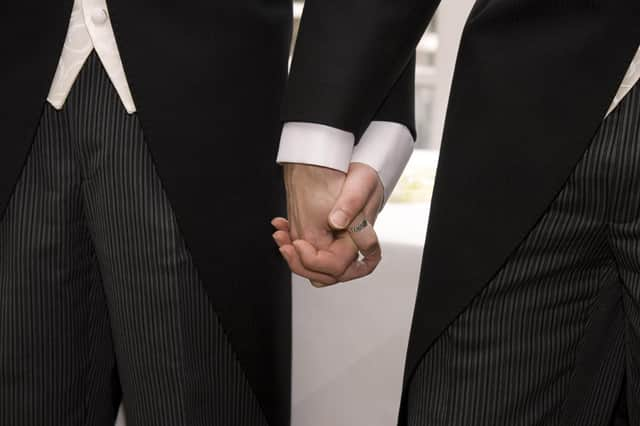John Coulter: Gay policy for churches is tricky enough, handling trans issues will be even more so


Liberals and social conservatives, not just within the Anglican Communion, but across many Christian denominations and churches, have locked horns for years over the issues of same-sex marriages, blessings and partnerships.
While some ‘pass the buck’ to individual clerics, other churches have a clearer guidance on same-sex relationships and there is a huge debate among theologians and lay people on the issue as the battle rages over the interpretations of Bible verses and passages.
Advertisement
Hide AdAdvertisement
Hide AdBasically, this game of theological ping-pong revolves around the practical interpretation of these verses between social conservatives who maintain that the institution of marriage is between a man and woman, versus the liberals who maintain Scripture should be applied with the ethos of God’s Love, and ‘what would Jesus do?’
Most churches and denominations are trying to find a workable ‘half-way house’ solution – welcoming LGBT folk into a worship service, but muddy the waters theologically when it comes to sacraments, such as baptism, marriage, and communion.
However, even if churches and denominations can reach an ‘accommodation’ (if that is possible) between lesbians, gays and bisexuals, another major row is about to break out over the issue of trans rights and gender identity in the Christian church.
Traditionally, there has always been a gender issue with many Christian churches over the generations, especially over the role of women in the church.
Advertisement
Hide AdAdvertisement
Hide AdFor example, in Catholicism, only the male priest can say Mass.
In many Protestant denominations and churches, women are instructed to wear hats, or have their heads covered.
Women have traditionally had a raw deal, especially in the evangelical and fundamentalist wings of Christianity.
While some churches have ordained women as ministers, elders or deacons, some other churches will only allow women to speak if they are ‘giving their testimony’ explaining how they became a born again Christian, or at women’s events in the church.
Advertisement
Hide AdAdvertisement
Hide AdIn the sixties and seventies, it was not uncommon at church functions for a male to announce – ‘the ladies will now leave and make the tea!’ Even in the 1990s, a woman could be refused formal membership of a fundamentalist church if she did not wear a hat.
Trans rights will once again focus a very glaring spotlight on the church. Take the scenario.
A man and woman are getting married, but it is discovered that one or other of them was off a different gender at birth.
So, in reality, both partners were the same gender at birth.
Advertisement
Hide AdAdvertisement
Hide AdWould the Christian church be dogmatic and demand the folk getting married be different genders at birth?
For example, in the scenario above, the man was a male gender at birth, but the woman was also a male gender at birth, but transitioned to female, so technically, according to scripture, this is a wedding between a man and woman.
Will the Church start demanding proof of birth gender before the sacrament of marriage can be fulfilled?
Or, will it be a case as with same-sex relationships, there will now be another debate as to whether a trans person can have a marriage, blessing, or any of the other terms which the church has used in the same-sex theological debate?
Advertisement
Hide AdAdvertisement
Hide AdPope Francis, as the leader of one of the largest Christian denominations in the world Catholicism, could ease the situation by scrapping the celibacy rule allowing ordained priests and nuns the right to chose to marry or remain single.
It has been suggested that the main reason the Vatican is dragging its heels on this issue, of choice regarding marriage, is what happens if the marriage breaks down – would the woman, for example, have the right to own half of the parochial house?
There are already married priests within the Catholic Church, namely ordained priests, for example, from the High Anglican Church who were married and defected to Catholicism.
Likewise, for many years, some fundamentalist denominations would not marry a person if they were a divorcee.
Advertisement
Hide AdAdvertisement
Hide AdAnd there are even some fundamentalist denominations which would frown heavily if someone tried to marry ‘outside’ the denomination.
For example, a person from the Exclusive Brethren denomination wanting to marry a person from mainstream Irish Presbyterianism.
Trans rights and gender identity are certainly issues which have been recently to the fore on the political front, especially in Scotland.
The Christian church may still be struggling with how to deal with the issue of same-sex relationships, But it needs to realise an even more thorny issue is rapidly coming down the tracks in terms of a theological debate – and perhaps, yet further rifts and splits.
• Dr John Coulter on Twitter has been a journalist since 1978, including with this newspaper.